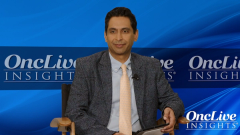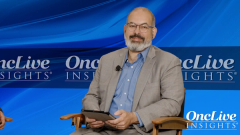
Practical Considerations Regarding the Incorporation of Supportive Care Into Practice
Jorge Nieva, MD, and Ashish Saxena, MD, PhD, consider the broader impact of supportive care on cost burden and quality of life and share scenarios in which supportive care is most appropriate.
Episodes in this series

Transcript:
Ashish Saxena, MD, PhD: For your practice, how do patients respond to getting these supportive care measures? When do you think is the best way to introduce supportive care for patients? Do you have any examples of how you may have done this with your patients?
Jorge Nieva, MD: I really think it's important to standardize. At our institution, we try to make the supportive care plan standardized to every chemotherapy regimen. You don't want to mismatch and use the wrong antiemetics if you're using highly emetogenic chemotherapy, and by the same token, if you're giving very myelosuppressive chemotherapy, you really should default to using an optimal strategy for supportive care, whether that's growth factors or trilaciclib. One interesting story that I have around that is that I was taking care of a patient, and they were treated with our standard approach, which incorporated trilaciclib for their first cycle, and then they couldn't get it in their second cycle for a variety of different reasons. That really made a profound difference in how the patient was feeling, what happened with their overall counts, delays for the subsequent cycle. As you know, dose intensity is also important. That really brought it home to me that making sure that that were as standard as possible and as regular as possible in how we incorporate these medications is important.
Ashish Saxena, MD, PhD: I agree totally, and I've had experiences before trilaciclib. I had given chemotherapy, and the patient comes back for a follow-up, and they're a little anemic and not feeling great. But then they say, “OK, maybe she got a transfusion”, and they're like, "Well, I have to wait now, I have to get my typing screen, I don't want to wait here, so I'm going to go home, I'll be OK." Then the next thing is, they say, "Well, I felt worse, I had to go to the emergency room. And now I'm getting transfused there." Which makes you feel like, "Oh, if I could have prevented all of this, it would have been so much better than having to go through these things."
Jorge Nieva, MD: We've talked a little bit about costs. In addition to reducing chemotherapy induced myelosuppression, improving quality of life supportive care with trilaciclib, it has been shown to be cost beneficial as well. Can you reflect on how factors like quality of life and cost burden can influence your treatment decisions and considerations?
Ashish Saxena, MD, PhD: Cost is a big thing we've seen, especially in oncology, the cost of medications and treatments are really high. It can cost the patients in terms of the treatments and what's covered by insurance. Having a treatment option that has been shown in studies to be cost effective by preventing the complications of myelosuppression, whether it's having to come back in and get transfusions or antibiotics if you're neutropenic, going to the hospital with neutropenic fever, so preventing all that has been shown to save money. That's really important for general economic well-being of our medical system. In addition, we talked about quality of life, and whether the patient's feeling better, and they also will feel better if they're not having huge expenses that they may have to pay some of out of pocket.
Transcript edited for clarity.






































